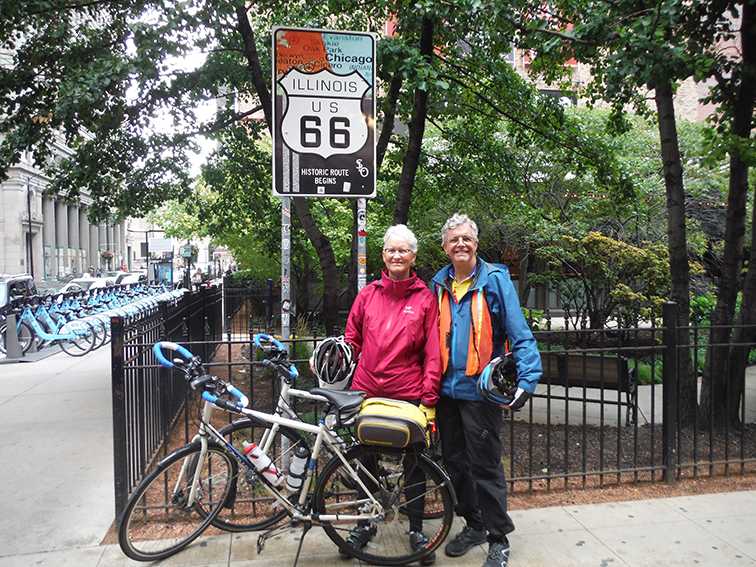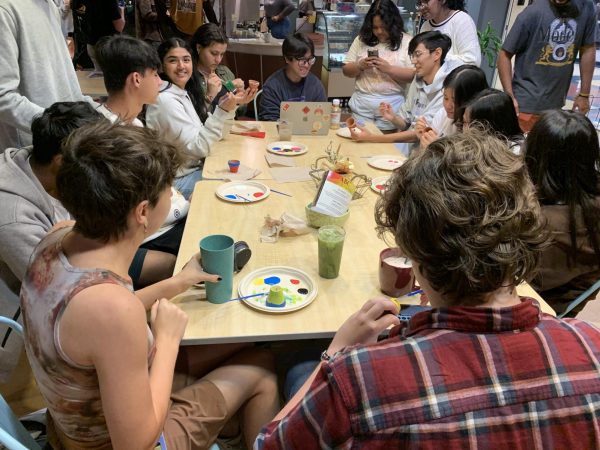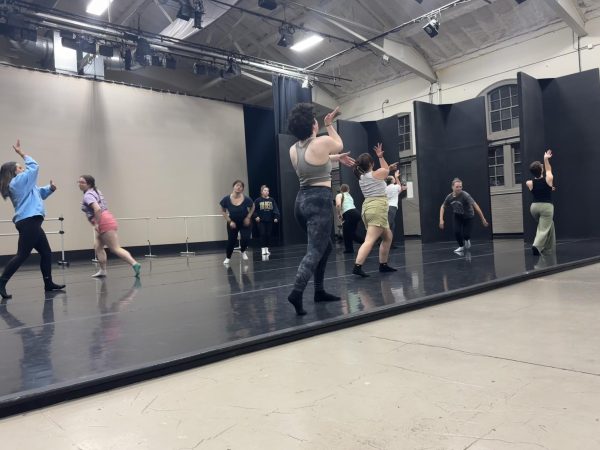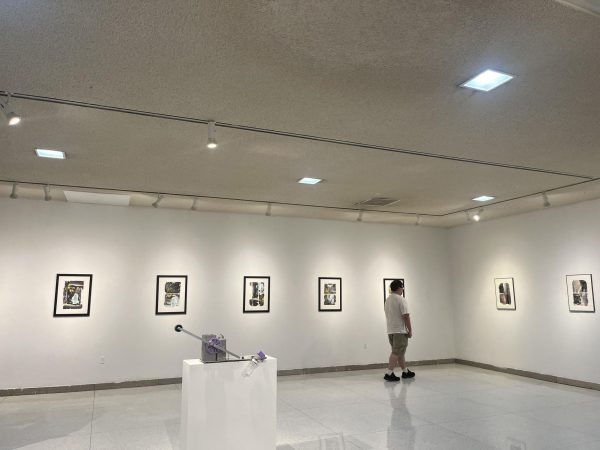College Trustee takes on Route 66
Photo contributed by Sue Steven
Board of Trustees member Sue Steven, ’75, and her husband, Craig Blasingame, pose in front of a Route 66 sign in Chicago, Illinois at the end of their bike trip from California to Chicago on Oct. 2, 2016.
Allegheny College Board of Trustees member Sue Steven and her husband, Craig Blasingame, cycled the old Route 66 road from California to Chicago. They began in August and the trip took them six weeks in total. Their only deadline was to be in Meadville by Thursday, Oct. 6 for Steven’s Board of Trustees meeting.
Route 66 is a historic highway; it was the first paved road from Chicago to the West Coast, according to Steven. It played a key role in the great migration of people from the East to West Coast, particularly during the dust bowl in the 1930s.
According to Steven, about 20 years ago, a local barber in Arizona set up a non profit organization to try and get people back on Route 66 to revive the small towns which have suffered since the development of the interstate system.
“The whole idea was to drive through these small towns, shop in these little stores, eat in these little diners and restore the economy to all these little towns that were so important to America,” Steven said.
They cycled one at a time and traveled in an electric car that contained all of their camping equipment.
“I rode in the morning, and he broke camp and packed up the car, and then we met for lunch, and he rode his bike in the afternoon and then I drove ahead and set up camp,” Steven said. “The whole trip was 100 percent green because we were either biking or driving an electric car, so we didn’t use any gasoline … the whole way.”
They also worked to spread the word about Allegheny as they traveled across the country and distributed brochures to all the small towns they stopped in.
“I was trying to get the word out about Allegheny to these smaller towns that probably haven’t ever heard of Allegheny,” Steven said.
Steven has biked her whole life, and said her first overnight bike ride was at Allegheny College with the outing club. She graduated from Allegheny in 1975. Steven and her husband have already completed two long-distance bike rides through America. The first was four years ago in 2012, when they cycled from San Diego, California to St. Augustine, Florida. The second was when they cycled border-to-border from Vancouver to the Mexican border in Californie.
“This was definitely the best trip we’ve done. In some ways, it’s not as scenic—the pacific coast trip was very scenic and the camping was better—but this was just more about America and what people can do if they put their minds to [it],” Steven said. “Physically, it was an easier trip, but it was more interesting because every state approached how they were going to restore Route 66 a little differently.”
The pair traveled through eight states in total, and spent anywhere between three days to a week in most states. They took turns riding about 20 to 30 miles a day, and spent two months leading up to their trip planning their exact route.
“We had a couple of 30- mile days each. Because of the way that the towns are, the places to stay were lined up,” Blasingame said.
While traveling, they would sit for half an hour each night planning their ride for the next day, in particular the times and locations for meeting spots. Because a lot of the country they rode through had little to no cell-phone reception, Steven said this was critical to the success of their trip. During the six weeks of their trip, the two only suffered one flat tire, which occurred when they did not have cellphone reception.
“Two thousand miles and one flat tire is not too bad,” Blasingame said.
Steven said one of the most interesting parts of the trip for her was the number of European—particularly Eastern European—tourists they met.
“We asked them, ‘why are you riding this road? Why are you here?’” Steven said.
The interesting part, Steven said, was the response they received.
“They had—back in the Iron Curtain days—heard about America and the land of the free … and they had heard that [Route 66] sort of represented freedom in America—getting a car and just driving and discovering the West,” Steven said. “Now that they can travel freely, they have clubs in these countries that are called the Route 66 clubs, and they come over here together and drive or ride the road. They will either get 20 people in a group and rent Harley Davidsons and ride motorcycles, or they’ll all rent Mustang convertibles … [or] they’ll rent an old car … and they do the trip from Chicago to California.”
Steven said that you can drive the route in about a week or two.
“That was really fascinating to me. They wanted to see what it was all about,” said Steven. “They wanted to see what this mystique about America and the Route 66 was all about. And they were all having a great time.”
According to Steven, there are many iconic and unique attractions to visit. She and Blasingame’s favorite was the rumble strips in New Mexico.
“I’m riding my bike and I see this sign. The first sign says, … ‘if you want to hear the music…’ and the next sign says ‘slow down to 45 mph’ … so I’m riding my bike and the next thing I know a car goes by me and they had slowed to 45 and there’s little strips in the road … and they had built this rumble strips so it would sing ‘God Bless America,’” Steven said. “It was just something that they did to try and get people to slow down and pay attention to the road.”
Despite riding for hours alone at a time, Steven said she did not feel endangered at any point. She said that the first time she rode cross country, she was a little worried about riding in certain states as a women. However, after completing her third cross-country trip, she is no longer afraid. At times, she believes people are more friendly to her riding alone than they are to her husband.
“You meet these wonderful people as you go and they’re all looking out for you,” Steven said. “People are not broken or evil as our media sometimes tells us that they are, so I feel very safe out there.”
As well as camping and staying in hotels, the couple also found accommodation through the website Warmshowers.
Warmshowers is a hosting site for cyclists on which people can volunteer to host passing cyclists in their home or find places to be hosted for free. Steven said the couple has done both in the past.
“The first thing you get is a warm shower because you stink. The second thing you get is a nice warm bed, and often they’ll make you dinner and breakfast and good conversations,” Steven said. “People are so generous out there and so nice, and so open and willing to let a stranger into their house, and sleep overnight and eat their food and shower in their shower.”
Dale Nimmo hosted the couple as they traveled through Springfield, Missouri. Nimmo said he loves hosting cyclists and learning about their tips and tricks of the trade.
“Anytime I can help people … I’m more than happy. I love to hear their best ideas and their worst mistakes and learn from them,” Nimmo said. “[The best part of Warmshowers] is knowing that there are people available if you have trouble. You’re not alone.”
Nimmo said his friends are often amazed at the way he opens up his home to strangers.
“I say, ‘why not?’ I have never had trouble and I never expect trouble,” Nimmo said. “This is pure fun. I’ve had people from South Korea, Germany and Taiwan, and it’s marvelous.”
The couple echoed Nimmo’s attitude, saying that the people they meet are often the best part of their experience.
“People generally are pretty nice. I think that’s the highlight of any kind of a trip like that, is that you find out how kind and generous people are, and how interested they are in you,” Steven said.
She recommends to any students traveling home from Allegheny over breaks to get off the interstates and take the back roads home for a change.
“It will be so much more fun,” Steven said. “Truly more relaxing, and just more enjoyable.”







Rasheed • Oct 15, 2016 at 2:31 am
I am currently WALKING Route 66. I have made it to Oklahoma City. I am taking a break to celebrate my son’s birthday and will back in OKC on Oct 23rd to continue westward.
I actually met Dale Nimmo in Hall Town, MO where he had accompanied a German cyclists Christian Vetter. Two days later, I met another German cyclist who had stayed with Dale. She stopped because Dale had told her to look for me. Then the next day, I met Mishelle, who had hosted the this lady. What a small world.